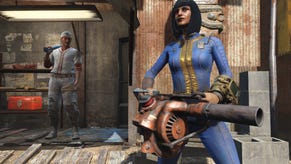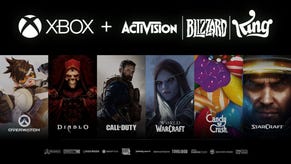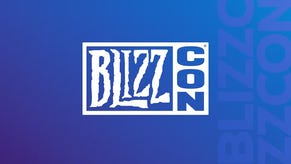Interview - Microsoft's Aaron Greenberg
Aaron Greenberg is not the man you expect him to be. Once famed for his tirades against 360's competition, Xbox's director of product management is not actually green. He is, in fact, very pleasant. He smiles; he laughs; he exudes a relaxed air you wouldn't have naturally associated with an integral player in Microsoft's E3 planning, speaking first thing on a Wednesday morning smack in the middle of the show. He gives great dictaphone.
VG247 quizzed the Xbox boss on Kinect, the core, the politics behind securing exclusive reveals for the Microsoft press conference and why he's not convinced the market's right for a 3D push.
How's E3 been for you so far?
Aaron Greenberg: It's been a great show. We've been working hard for many months to share a lot of our innovations during E3. It's exciting to finally have it out there, get people to have hands-on with Kinect and let everyone see the brand new Xbox 360. We've had world premieres of some of our big games like Halo's campaign, Gears of War 3, Fable, etcetera. Lots of stuff to share.
How difficult has it been for you to marry showing off the hardcore stuff like Gears and the very casual stuff like the Rare games?
Aaron Greenberg: I think what's really unique about the Xbox 360 is that we're the only platform that's able to show that range. We really believe that we can deliver the best blockbuster core games in the industry and also offer new experiences that allow a more casual user to come in as well.
I mean, we started that evolution a few years ago with things like the New Xbox Experience, adding movies, music and so on to the service. We added social networking last year with things like Facebook and Last.fm, and now this year we've added Kinect on top of all that, taking those experiences and making them controller-free, adding new experiences with Kinect; it's all part of that evolution.
But at the same time, we've never had a bigger year for core games as we'll have this year. Last night was a great example of that. We had a dedicated event just for Halo: Reach and we premiered the new Firefight mode. At the same time there was a 30-minute Cirque de Soleil special on Nickelodeon and MTV here in the States for the Kinect world premiere.
We're able to speak to different audiences at the same time. We're uniquely positioned to have that range and that variety of experiences.
There's been a large amount of debate as to whether the motion camera is applicable to the core. Our audience is very much "core". Do you even need to tell them that this is a core gaming device, or is this something you want to focus on the casual side with?
Aaron Greenberg: There's a couple of things. One, I'm a gamer too. The first thing I think gamers want to be reassured about is that we're not going to take the games that you know and love and the gameplay that makes sense with a controller and replace it: this is additive to what exists today.
We're investing in building great blockbuster games that are made to be played with a controller, and we're adding new partners like Crytek to our family, and we'll continue to invest. But at the same time this allows us to add new experiences.
As a more core-oriented guy, I'd say the thing I'm more excited about is the entertainment functionality, the dashboard navigation and the voice navigation. The ability to interact with just my hands and my voice is just super-cool.
When people get hands-on, what we're hearing from people is that, even when they're playing the stuff that's designed for a broader audience like Joyride, it's so much fun to play, to just jump in and jump out: it's just a different type of experience. It may not be the type of game you play for an hour, and it's not about clearing levels and spending 15 hours play, but it's still a lot of fun. The replay value is still really high.
I was told just before the show that you can plug a controller into Kinect. Can you play the Kinect games we're seeing with a controller, or are they only playable with the camera?
Aaron Greenberg: Kinect is so revolutionary that the games we're designing for it are built from the ground up uniquely for Kinect. The controller-based games are on one side, the Kinect games are on the other side. You can't just plug in a controller and use it. We believe that the difference in the interface is pretty substantial, and having 16 buttons versus mapping different parts of your body and voice control…
That said, we know that millions of sensors will be out there starting this holiday, and that will enable us to add functionality and augment the experience. So you could see voice and some scenarios where we could add functionality that's optional to games that are designed primarily for a controller, but add some functionality on top of that: we absolutely plan to do that.
One of the stand-out moments of you conference was the Metal Gear: Rising trailer. It looks phenomenal. It's a major coup for you to get that in your conference. Can you give our readers a little insight into the sort of politics that goes on behind being able to show a game like that for the first time in your conference?
Aaron Greenberg: Well, the fact is that Don Mattrick, the head of our business, has a great relationship with Kojima-san, and we are obviously big fans of the Metal Gear series. We all grew up playing it.
As we thought about this generation, you've seen that our strategy is to have the most exclusives and the biggest blockbuster games. We've invested in Halo, and Gears of War, and Fable, and Alan Wake, and Crackdown 2, and a lot of the big titles that we think you'll buy an Xbox 360 for.
At the same time we realize there's a whole set of big franchises that we never had on our platform, things like Final Fantasy; Metal Gear was a great example of that. We feel like we've kind of removed that. Now, all the biggest games are really available now on Xbox 360. If you're a gamer you have to have an Xbox, because that's where those games are at.
To have Hideo Kojima come back this year was the perfect follow-up to last year. We were very cognizant about the things we promised last year and wanting to deliver: this is one example of that. When we unveiled Project Natal last year, we showed a vision with the video and some of the tech demos we did. We feel like we're here and we're delivering on that. It's real, it works. I think we're way over-delivering on things like voice and navigation, that no one ever expected. Plus there are really a lot of great games that are just scratching the surface, because we're just talking about our launch line-up at this point.
Your core content's entering a transitional phase. Bungie's moving out with Halo and we're seeing Gears of War 3, which is the third part in the trilogy. A lot of your big first-party product studios are moving on to different projects, or going multi-platform. How are you keeping 360's core output together? Is this a difficult time for you, or do you see it as an opportunity?
Aaron Greenberg: On a macro level, I think what we're seeing is that the big, independent studios are absolutely going multi-platform. Bungie's one example of that, but the nice thing is we have a great relationship with Bungie. They've built a big base of fans, obviously, not just with Halo but what's happened with Xbox Live. We think we need to be the platform of choice for their titles and we're excited. We know that whatever they're working on for the future will be great.
At the same time there are benefits for us, because we're seeing studios like Insomniac going multi-platform. We've always admired their creativity and the brilliance they bring to this industry, and so to be able to now share that is exciting as well.
That's just the independent guys. Then we have all the studios that we own internal, like Lionhead and their work in Europe, and Rare. We have a bunch of internal studios like Turn 10 which you're seeing here at the show. And then a whole series of partners we're working with to being great exclusive games to the platform.
We're really investing heavily, and adding and building our core, just like we have over the last few years. The announcement we made with Crytek for Kingdoms is just one example of that. There are many more of those in the works as well.
I'm not sure if you watched the Sony conference yesterday or not, but there was a huge focus on 3D. You're both talking a lot about motion at the moment, but 3D for them is incredibly important. They make 3D TVs, and there's an obvious marriage there. I think it's something you personally have spoken out about and said it's a really expensive thing for the consumer and could potentially ostracize an audience. Do you still think that, or is this something you're going to have to adopt into the 360 output at some point?
Aaron Greenberg: We're a fully 3D-capable console today. We support 3D games that are in the market today. If you look at things like Avatar and the new Batman game, and some of the titles that were announced in 3D [at E3] like Crysis 2, they're coming to Xbox 360. There's no confusion that anyone looking for a 3D gaming experience will find those same experiences on the Xbox.
We're also demoing here, behind closed doors, movies in 3D running on Xbox 360. The capability is there. The question is whether or not the consumer demand is there. That's the unanswered question. We're not a consumer electronics company that's trying to sell 3D TVs, so we have the benefit of waiting until the market responds. We're going to take probably more of a pull than a push approach.
What we're excited about with things like Kinect is that we're able to deliver fun new experiences that don't require you to buy a new TV, that we think we deliver great value. As we think about our total cost of ownership story, we can really scale something that will be approachable to a very broad set of consumers. When you start to get into technologies that require you to buy new TVs or buy expensive glasses… The experiences may be fun, but the more expensive it gets, we know the more narrow the market opportunity becomes.
Technologically we're ready and capable and demonstrating that, but we'll wait for the market to respond.










